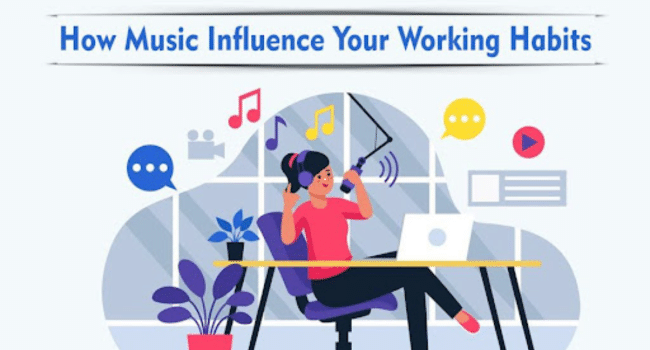Table of Contents
Music isn’t just something to pass the time; it is something relaxing that can shape the way we work, boosting productivity, creativity, and even mood.
No matter whether you are counting, searching for new ideas, or doing repetitive tasks for your work, the right choice of soundtrack can help you focus, energize your mind, and reduce stress.
Ever found yourself more productive with the perfect playlist? That’s because music has the ability to tap into your brain’s natural rhythm, helping you stay in the zone.
Ready to discover how your favorite tunes can transform your work habits? Let’s dive into how music influences your working habits.
Ways Music Influence Your Working Habits
Music can have a significant impact on working habits, and its influence often varies from person to person depending on the type of work, the genre of music, and individual preferences.
Here’s how music can influence your work:
1. Boosts Focus and Productivity
For many people, listening to music can help improve concentration, especially for tasks that are repetitive or require deep focus. Many free music apps provide a seamless background music experience.
Instrumental or ambient music, such as classical, electronic, or lo-fi beats, can create a background rhythm that helps to block out distractions. The steady pace of music can also improve your flow and keep you on track with tasks.
- Why it works: Music helps to tune out distractions, making it easier to concentrate and get into the “zone.”
2. Improves Mood and Motivation
Music is known for its ability to uplift mood and boost motivation. Upbeat tracks or your favorite songs can energize you, making it easier to start tasks or power through a long workday.
When you’re feeling unmotivated, a good playlist can bring your energy levels up and make even the toughest projects feel more manageable.
- Why it works: Music stimulates the brain’s reward system, releasing dopamine, which enhances feelings of happiness and motivation.
3. Enhances Creativity
Certain types of music, especially instrumental or genres like jazz, can help stimulate creative thinking. Many people find that listening to music while brainstorming or working on a creative project like writing or design helps ideas flow more freely.
Music without lyrics is often preferred for these activities, as it doesn’t distract from the creative process.
- Why it works: Music can stimulate the brain’s creative centers, encouraging new ideas and innovative thinking.
4. Reduces Stress and Anxiety
Work can often be stressful, and music can act as a soothing balm for nerves. Calming music, such as nature sounds, classical music, or soft jazz, can help reduce anxiety and lower stress levels.
When stress is minimized, it’s easier to stay focused and make more thoughtful decisions.
- Why it works: Relaxing music can lower cortisol (the stress hormone), making it easier to stay calm and clear-headed.
5. Improves Memory and Learning
Research has shown that music can enhance memory retention and learning capabilities. For tasks that require memorization or studying, background music can help reinforce learning by keeping the brain active and engaged.
- Why it works: Music increases brain activity and helps strengthen neural connections related to learning and memory.
6. Sets the Pace of Work
Music can help set the pace for different work tasks. Fast-tempo music can help with tasks that require energy and speed, like cleaning up your workspace or finishing up reports, while slower tempos are better for tasks that require focus and attention to detail.
- Why it works: The rhythm of the music matches the pace of your work, helping you keep a consistent flow.
7. Encourages Consistency and Routine
If you create a work playlist that you listen to every day, it can act as a mental cue to get into “work mode.” The consistency of your music routine can serve as a signal to your brain that it’s time to focus, increasing your overall productivity and making it easier to get started.
- Why it works: Repetition creates a routine that conditions the brain, signaling when it’s time to work.
Final Thought
Music isn’t just background noise, it’s a tool that can influence the way you work, boosting productivity, creativity, and even mood.
Whether you’re tackling a deadline, learning something new, or just trying to get through a tough task, the right music can make all the difference. The key is finding the right genre or playlist that works for your individual needs.
